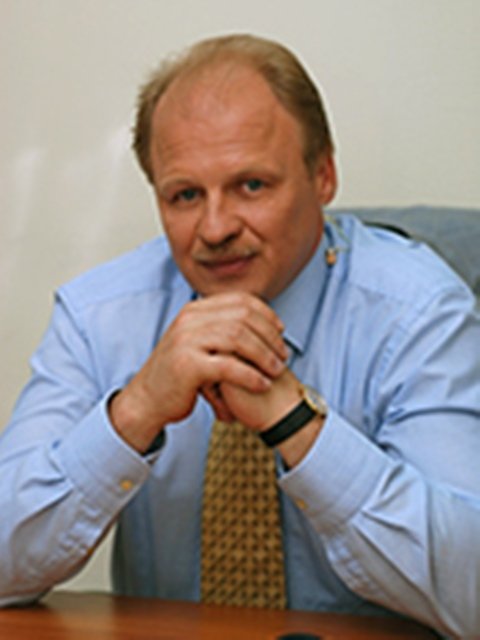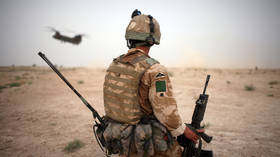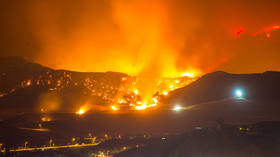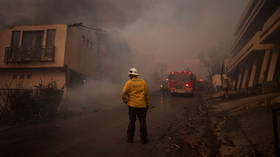Ignorance and attempts to rewrite WWII history – that’s what makes me sick
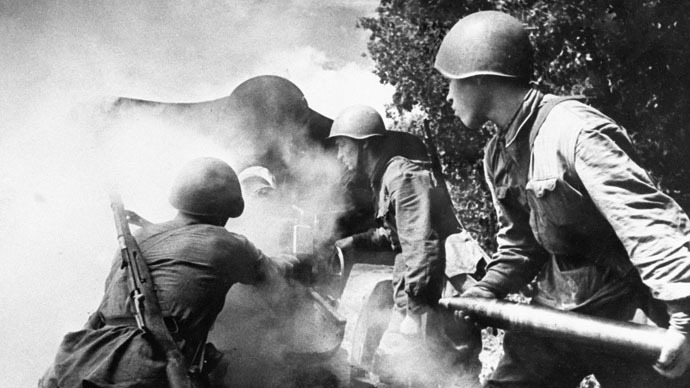
It was not the traffic jams in Moscow, nor the police reinforcements, and not even the nightly roar of hundreds of tanks running down my street towards Red Square to rehearse for the parade - it’s the media, who made me sick. And here’s why.
No more war stories! Over the last couple of months an avalanche of words has been wading through my brain, trying to persuade me that what’s good is good, what’s bad is bad, that the grass is green and the water is wet, that Hitler started the War, and that Stalin won it.
We get this in May every year, OK. But this time it was just too much of a good thing. And not because something was wrong with the war movies, documentaries and veterans’ interviews, but because it felt as if the widows shed their tears and the heroes shared their memories not with us, heirs of the victory, but with a bunch of foreign politicians and a herd of extremists who this year decided to extend the anti-Russian sanctions on our war memories. Why? Maybe because some in Europe feel that what we, Russians think about the war is a lot different from what the rest of the world considers being true? But is it? And if it is, is there anything frightening about it? Here – in a nutshell - is what the story looks like from our side:
For the Soviet people the Second World War started in July 1941, when Hitler invaded Russia. We call it “The Great Patriotic War”, likewise the fight with Napoleon back in 1812, when the Russians also had to drive foreign invaders away from their home. The Great Patriotic War was a part of the Second World War, though the Soviet propaganda never really cared a lot about the battles on the Atlantic, in the Far East and Africa. Because of that we consider these events insignificant, compared to the dramatic fighting in Europe, in which the Soviets lost, by some estimates, up to 35 million soldiers and civilians.
Yes, we do know what stands for Pearl Harbor and the Battle of the Bulge, but we are absolutely certain that the main forces of our common enemy were sent to conquer Russia. Out of 177 Wehrmacht divisions 136 were fighting on the Eastern front. That means, all in all, considering another 53 divisions of Hitler's satellite countries, the Red Army withstood the might of 237 divisions! No wonder there isn’t a military campaign in history that can be compared to the battles for Moscow, Kursk and Stalingrad - which were the turning points not only for the Great Patriotic War, but for the whole of WWII. After winning those three glorious victories the Red Army started chasing the Nazis back West.

Everybody in this country is perfectly aware of the fact that we were allies with the British, the French, and of course, the Americans whom we gloriously linked-up with on the River Elbe in April 1945. But we also remember how from the very beginning, in 1939, the West was hoping to orient Hitler to the East and make the German socialists and the Russian communists kill each other. Yes, Moscow did get tons of American supplies under the Lend-Lease Act passed in 1941, and the Northern convoys to Murmansk were a manifestation of real heroism by the Royal Navy. We also cherish the memory of the French Normandie-Niemen air squadron and Le Resistance, but the Russians will never forget that we had to suffer three long years, until our brothers in arms finally landed in Normandy in 1944. That reduced the distance between D-day and VE-Day for them to just 10 months, while for the Russians it was 46 long months of war… For the first time since 1941 Moscow really celebrated Victory on March, 26, 1944 - the day the Soviet troops crossed the River Prut and recaptured the state border. By the time the allies crossed the Channel three months later the Red Army had started its victorious march across Europe, liberating Romania, Hungary, Bulgaria, Czechoslovakia, Austria and Norway. The heaviest price we paid during this operation was for ousting German troops from Poland: 600,000 Soviet soldiers were killed on Polish soil.
The local patriots, partisans and resistance groups joined the Russians along the way in their unstoppable pursuit to Berlin. The red flag was hoisted over the Reichstag on May 1, 1945; Berlin surrendered to the Soviet victors. And, finally, on May 8, quarter to midnight, German Field Marshal Wilhelm Keitel signed the unconditional surrender document. That was it. Any questions? Protests? Suggestions?
Oh, yes. Why are the Russians celebrating on May 9? Because of the time difference: the news came to Moscow early morning that day in 1945. And nothing else behind it; no politics, not even haughtiness. For 70 years now May 9 has been a sacred date for all Russians because, literally, there isn’t a single family in the country who hasn’t had a member who fought in the Great Patriotic War.
So, what’s wrong this time? Why do I feel fed up instead of feeling joy and pride for the winners of the greatest battle in History? Because of the unprecedented political campaign this year initiated by the Euro dwarves - former Soviet provinces. They try to be important, but their new ideology no longer allows them to be part of the Soviet victory over Nazi Germany. So – they think that their best bet now is to try to team up with the West and play victims. High school education in most European countries today is a joke, which opens wide perspectives to rewriting the history. Mass ignorance allows them to call the 1939 Molotov-Ribbentrop Pact, which was a Treaty of Non-aggression between Germany and the USSR – a “conspiracy to joint conquers”.
Some may find it irregular, but the Russians are used to people around the world, and, definitely, in Europe expressing gratitude to the Red army for liberating the continent from fascism. It was taken for granted for decades. This is why we practically ignored the launch of the recent “Anti-Russian War Glory” campaign. And this, maybe, is why the Russians experienced such a shock when they started demolishing monuments to the Russian soldiers who gave their lives fighting in Europe.

But real outrage started to accumulate when the Russians felt that it wasn’t just ungratefulness, but, most likely, a campaign, staged in Washington who feels time has come to acquire all the credit for all the Victories in history. It meant – humiliation of the value of the Russian contribution.
Simple proof was provided last week by the US permanent representative to the United Nations Samantha Power in a speech in front of the UN General Assembly. The Diplomat cited the diary of Tanya Savicheva, a little girl who perished in the siege of Leningrad.
“We must remember why the Allies fought their way to liberate death camps like Mauthausen; and why children like 11-year-old Tatyana helped dig trenches to defend their besieged city of Leningrad. They fought because – as Winston Churchill put it – We are fighting to save the whole world.”
Except Tanya Savicheva, Ms. Power! She suffered three years of Nazi siege, and was rescued by the Soviet soldiers long before Field Marshal Montgomery even started to plan Operation Overlord! The long-awaited Second Front was opened in Europe six months after the complete liberation of Leningrad from the blockade. So what has prevented the US and the UK for 2 and a half years to start helping this country to save Tanya and hundreds of thousands of other Russian, Ukrainian, Belorussian, Polish children?
Maybe the same reason, that is now preventing the US and European politicians to bother about the fate of children still alive in Donbass, but suffering under daily shelling and humanitarian disaster caused by a modern blockade? The obvious message of Ms. Power to these children is: “Mail me your touching diaries and try to die on the right side of history. Leave it to me to make you famous later…”
For the last couple of months Russian TV has been running war movies 24/7 on all available channels. What makes me sick is a suspicion that I was not the target audience. Maybe this is the Kremlin’s “soft power,” an attempt to make at least some Western bowlers see a Soviet war film. Why? Because - compared to any one of them - Schindler’s List and, Saving Private Ryan look like Scooby Doo, versus The Deer Hunter. But Cimino's film was about a lost war.
These days we were commemorating our joint victory against Nazism. That is the only reason the leaders of Europe were so much welcome in Red Square on May 9. Those, who didn’t show up may have made the right political decision, but a major historical mistake.
MORE:
The statements, views and opinions expressed in this column are solely those of the author and do not necessarily represent those of RT.
The statements, views and opinions expressed in this column are solely those of the author and do not necessarily represent those of RT.
